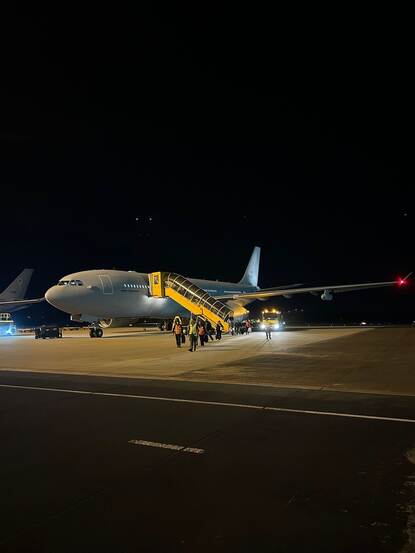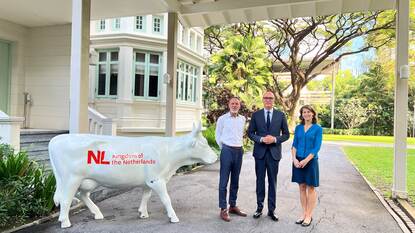Text Marjolein Kooi
Photo Josje Deekens
In a crisis situation, basic services such as flights and financial transactions are often the first to be disrupted. How can an organisation sustain its financial processes in circumstances like the war in Sudan? For the Financial Service Organisation (FSO), this means being prepared for the unexpected. During and after the evacuation of BZ staff from Khartoum, FSO ensured the continued payment of invoices and salaries even when banks closed and transaction systems were disrupted. Four of its staff members explain how FSO supported embassy staff and crucial processes throughout the crisis.

‘During a crisis like the one in Sudan, the biggest challenge for FSO is the disruption of banking services.’
Banking services disrupted
Debbie Guddens, head of FSO’s Payment and Cash Management Division (FSO/PCM), explains how quickly her 16-strong team had to adapt when war broke out in Sudan in April 2023. ‘As the situation in Sudan deteriorated, we had to prepare for the possibility that staff in Khartoum would be unable to continue working in safety. That meant not only thinking about how to keep them safe, but also making arrangements to avoid disruption of crucial processes such as financial transactions from the Netherlands.’ As head of PCM, Debbie advises policymakers about payment systems and contributes to crisis team calls regarding specific questions around transactions. ‘During a crisis like the one in Sudan, the biggest challenge for FSO is the disruption of banking services. Banks close when a situation becomes too dangerous. And sanctions prevented us from making payments from here in the Netherlands. Flexibility is crucial when there’s a crisis. For instance, you need to have direct contact with international banks and alternative channels for financial transactions. I felt the weight of the responsibility, mainly because people were so dependent on us to get our work done.’

‘It was a big relief when it was confirmed that the salaries had all come in on time.’
Evacuation
Marie Smit, second embassy secretary in Sudan, was previously responsible for the migration dossier. When the war started, her focus shifted to humanitarian assistance. ‘A lot of staff could be evacuated to the Netherlands when the war broke out, fortunately. Others left of their own accord, moving to safer areas of Sudan and to neighbouring countries such as Egypt, Eritrea and South Sudan. FSO helped map out where staff were staying, took decisions on payment procedures and ensured that salaries and allowances could be processed as quickly as possible. For the many local employees who abruptly lost their jobs when the war began, even a bus ticket out of Khartoum was prohibitively expensive. To enable them to move to safety, it was vital that they receive their salaries and redundancy pay. This required flexibility on the part of FSO. Such an urgent situation called for quick, creative solutions,’ says Marie. She and her Sudanese colleagues worked hard to help staff members who were in difficulties. ‘Even as they fled Sudan themselves our Sudanese staff members were still helping others, for example by lending their own money to colleagues without bank accounts. It’s important to look at each person’s situation separately and work out an appropriate and creative solution as quickly as possible,’ says Marie.

Improvisation is essential
Debbie’s team in the Netherlands worked with colleagues in Sudan to keep transactions rolling with only the minimum of resources available as staff were evacuated from Khartoum. ‘We were grappling with banking disruptions, a poor internet connection and limited communication with the team on the ground. At times like that it’s essential to improvise. Rather than focusing on the impossible, you have to figure out what is possible, which often means thinking outside the box and in different ways than you’re used to. After local employees were evacuated, FSO’s Operational Management Division (FSO/BBV) instructed us to prepare envelopes containing salaries and/or allowances so they could be handed over to staff when they arrived at the airport or a temporary address in the Netherlands. It felt like a race against the clock, but we managed to finish in time and pay everyone. That was so rewarding,’ she says. ‘During a crisis there are regular consultations both within FSO and between the various operational management departments and the mission. Everyone takes a committed and service-oriented approach to helping the mission and all its staff as quickly and as well as possible.’

‘Experience at FSO comes in handy as a SCOT member, when there’s no script and cooperation, communication and initiative are crucial.’

Emergency plan in action
FSO’s head of operational management Colin Mulders says that international transactions can be very complex, particularly during a crisis. ‘That’s why FSO works with direct contacts – so important invoices don’t get lost in the everyday flow of paperwork. From the HR department to the embassy, everyone knows what their role is and takes an out-of-the-box approach to ensuring that the mission continues to receive the money it needs. During the crisis in Sudan we made sure that invoices were processed and paid quickly, even when financial transactions were almost completely impossible. We took care of existing and new financial obligations and advance salary payments for local employees. They were very concerned about how and when they would be paid, so it was a big relief when it was confirmed that the salaries had all come in on time. Even after the evacuation we kept lines of communication short and paid invoices as quickly as possible, for instance for accommodation for evacuated staff members and their families.’ Colin says that the crisis in Sudan showed FSO how crucial it is to get involved right from the beginning. ‘Thanks to our expertise around international transactions we’re able to suggest possible solutions immediately.’
SCOT team
Besides his day-to-day work for FSO/PCM, Andreas Steinböck is also a member of the Rapid Deployment Consular Support Team (SCOT). He explains the complementary aspects of these two roles. ‘International transactions are complex, because they take place across borders and are subject to regulations and rules on compliance and because they require us to cooperate with missions and banks around the world. At FSO it’s all about thinking with other parties, finding solutions and responding flexibly as a situation evolves. That experience comes in handy when you’re sent into a crisis situation as a SCOT member, when there’s no script and when cooperation, communication and initiative are crucial.’ He describes his first SCOT deployment to Tel Aviv as mentally challenging but enriching. ‘All of a sudden you’re in a situation that is completely new and unpredictable. It’s intense. But it’s also very energising to know that your work is contributing directly to the security and stability of colleagues in the midst of a dangerous situation.’
The power of cooperation
FSO’s strength lies in its flexibility, its ability to cooperate and good preparation. Debbie: ‘We have short lines of communication between local staff, local and international banks and the ministry. In a crisis like the one in Sudan, there’s no time for bureaucracy. Everyone has to be able to trust each other blindly. We had back-up plans and a flexible team, so we were able to change course quickly. Sometimes we had to improvise and change our approach, but we always found a way to do what we needed to do. In short: we know we can count on each other. We won’t let anyone down.’
Read more about the Financial Service Organisation (FSO)
- Financial management with a smile | Financial Service Organisation (FSO) | BZ Operational Management Magazine
- About FSO – Rijksportaal (overheid-i.nl)*
- SSP FSO Procurement*
- Working for the Rapid Deployment Consular Support Team: ‘You’ve got 15 minutes to get 100 Dutch nationals on a plane’ – Rijksportaal (overheid-i.nl)*
*Please note: these links can be accessed by central government staff only










